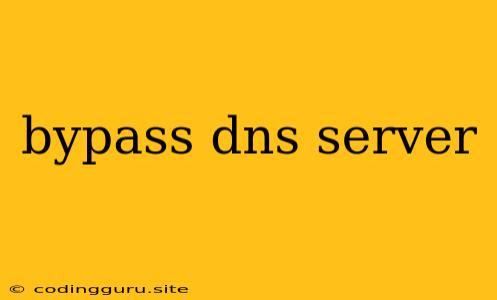Bypassing DNS Servers: Understanding the Techniques and Risks
In the digital world, Domain Name System (DNS) servers play a crucial role in translating human-readable domain names (like google.com) into numerical IP addresses that computers can understand. However, there are situations where you might want to bypass DNS servers, either for privacy reasons, to access blocked content, or to troubleshoot network issues.
But before diving into the methods, it's crucial to understand the potential risks associated with bypassing DNS servers. While it can offer advantages, it also opens up vulnerabilities that could compromise your online security.
Why Would You Want to Bypass DNS Servers?
Here are some common reasons why you might want to bypass DNS servers:
- Privacy Concerns: Your ISP's DNS server can track your browsing history, potentially revealing personal information. Bypassing it can help shield your online activity.
- Access Blocked Content: Some websites or content might be blocked by your ISP or local network. Bypassing DNS can allow access to these resources.
- Troubleshooting Network Issues: If you suspect your DNS server is causing issues, bypassing it can help isolate the problem.
- Speed and Performance: Using a public DNS server like Google DNS or Cloudflare DNS can sometimes offer faster and more reliable DNS resolution than your ISP's server.
How to Bypass DNS Servers
There are several methods to bypass DNS servers. Let's explore some of the most popular ones:
1. Using a Public DNS Server:
This involves configuring your device to use a public DNS server instead of your ISP's. Popular public DNS servers include:
- Google Public DNS: 8.8.8.8 and 8.8.4.4
- Cloudflare DNS: 1.1.1.1 and 1.0.0.1
- OpenDNS: 208.67.222.222 and 208.67.220.220
To configure a public DNS server:
- Windows: Go to Network and Sharing Center > Change adapter settings > select your network connection > Properties > Internet Protocol Version 4 (TCP/IPv4) > Properties > enter the preferred and alternate DNS server addresses.
- macOS: Go to System Preferences > Network > select your network connection > Advanced > DNS > click the + button to add a new server.
- Android: Go to Settings > Wi-Fi > long press the network you're connected to > Modify network > Advanced options > IP settings > Static > enter the DNS server addresses.
- iOS: Go to Settings > Wi-Fi > tap the (i) icon next to your connected network > Configure DNS > Manual > enter the DNS server addresses.
2. Using a VPN:
A Virtual Private Network (VPN) encrypts your internet traffic and routes it through a server in a different location. By using a VPN, you can bypass your ISP's DNS server and effectively change your location, accessing blocked content and enhancing your privacy.
3. Using a Proxy Server:
Similar to VPNs, proxy servers act as intermediaries between your device and the internet. When you use a proxy server, your requests are routed through it, allowing you to bypass your local DNS server.
4. Modifying Your Host File:
Your computer's hosts file allows you to manually map domain names to specific IP addresses. By adding entries for websites you want to access directly, you can bypass your DNS server for those specific domains. However, this method is not as reliable and is only suitable for a small number of websites.
Risks of Bypassing DNS Servers
While bypassing DNS servers can offer certain advantages, it's essential to be aware of the potential risks involved:
- Security Vulnerabilities: Public DNS servers can be targets for hacking, potentially leading to DNS poisoning, where malicious actors redirect traffic to fake websites.
- Privacy Concerns: While using public DNS servers might improve privacy compared to your ISP's server, these services may still collect data about your browsing activity.
- Reduced Performance: Using a distant public DNS server can sometimes lead to slower DNS resolution, impacting website loading times.
- Compatibility Issues: Some websites might not work correctly if your DNS server is bypassed, especially if they rely on specific DNS features.
Best Practices for Bypassing DNS Servers
Here are some tips to mitigate the risks associated with bypassing DNS servers:
- Choose Reputable DNS Servers: Opt for established and well-regarded public DNS servers known for security and privacy.
- Use a VPN for Privacy: If privacy is your primary concern, consider using a reputable VPN to encrypt your traffic and protect your online activity.
- Be Cautious with Proxy Servers: Be wary of using proxy servers from unknown sources as they could be compromised or log your browsing data.
- Monitor DNS Changes: If you experience issues after bypassing DNS servers, revert to your ISP's DNS or try a different public DNS server.
Conclusion
Bypassing DNS servers can offer advantages such as privacy, access to blocked content, and troubleshooting network issues. However, it's crucial to be aware of the potential risks associated with this practice and use the appropriate methods with caution. Always choose reputable DNS services, prioritize your online security, and stay informed about potential vulnerabilities. By understanding the risks and taking necessary precautions, you can enjoy the benefits of bypassing DNS servers without compromising your online safety.
